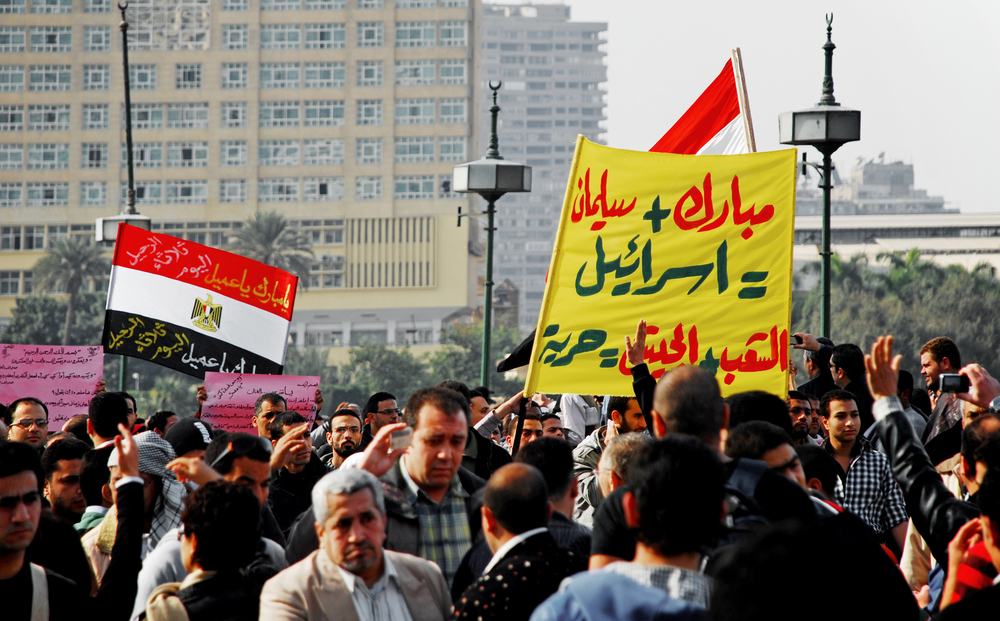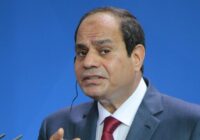If Sisi does not stabilize the energy and power sector, the Egyptian street’s patience will not last forever.
The Egyptian presidential election takes place between May 26-28, having been extended by one day due to low voter turnout. Former Gen. Abdel Fattah el-Sisi is poised to win by a landslide against left-wing candidate Hamdeen Sabahi.
The election comes after months of tension and violence in the aftermath of Mohammed Morsi’s ouster on July 3, 2013. Casualties on the sides of anti-coup protesters and Muslim Brotherhood supporters, and also of security forces, are in the thousands. Many Brotherhood members and secular youth activists have been imprisoned, while some have been handed extended jail sentences or even face death.
Sisi has vowed to restore stability. In a message to US President Barack Obama, the presidential candidate said: “We are fighting a war against terrorism.” Despite riding on a mass wave of support, however, Sisi’s critics accuse him of harsh human rights violations. When the former general assumes office, he will have to address many issues to please his supporters, including fixing the Egyptian economy.
Fair Observer’s Middle East Editor, Manuel Langendorf, speaks to Justin Dargin, a leading geopolitics expert. Dargin has extensive research experience in the Middle East and is the author of three books on the global energy market.
Langendorf and Dargin talk about the Egyptian presidential election, the country’s energy crisis and its potential consequences.
Manuel Langendorf: Let us talk about the Egyptian presidential election. There has been quite a build-up ahead of the vote and, having decided to resign from his military post, Abdel Fattah el-Sisi is set to win by a landslide. All this comes after a crackdown against the Muslim Brotherhood and its supporters. What is your view on the election? Should we expect any surprises from Hamdeen Sabahi?
Justin Dargin: The election will be pretty clear cut. Egyptians, at least in the urban areas, exhibited a strong desire to rid themselves of Morsi and his supporters from the organs of power. Therefore, Sisi received a mandate from the Egyptian people to try to bring order to the country after the chaotic years following the revolution. And, if we take the advance voting by Egyptians living abroad as a harbinger, Sisi holds a commanding lead over his challenger, Sabahi. In nearly every expatriate poll conducted, Sisi consistently won by a large margin over Sabahi.
However, the main issue for Sisi is not just winning the election: it is what to do the day after. It is about how to illustrate and maintain his political legitimacy, as well as stabilization of the continuing chaos in Egypt. Most of Sisi’s supporters and critics view the Egyptian presidential election as a type of referendum on Sisi’s continued rule as opposed to being a general electoral contest.
This election, therefore, seems to be somewhat in the vein of Gamal Abdul Nasser, who on June 23, 1956, held a double referendum — one to confirm him for the post of president, in what was essentially a coup that deposed King Farouk, and to approve the new constitution. And, in another similarity, prior to the referendum, Nasser launched a brutal crackdown on the Muslim Brotherhood.
But, all in all, no surprises are expected during this election.
Langendorf: How do you see the current role and situation of (youth) movements like Tamarod and April 6? The latter played a crucial role in mobilizing support against the Mubarak regime, whereas Tamarod was founded in 2013 and was pivotal in the ouster of former President Mohammed Morsi.
Dargin: The current situation for youth movements in Egypt is quite dire. The April 6 Movement, which was one of the most active youth groups in Tahrir Square, has been caught in the broad crackdown on dissent following the ouster of Morsi last summer. The April 6 Movement has indicated that it will not participate in the election, as it fears that Egypt is returning to its totalitarian past — the very thing they were protesting against in the beginning.
However, Tamarod, the youth movement that was instrumental in the downfall of Morsi, is faring much better and has plans to transition into a political party after the election. Essentially, Tamarod desires to evolve from being youthful “rebels” to a mature political organization that can show it is capable of political administration. Yet it must be considered that Tamarod’s opinion is not unified. While it appears the majority support Sisi, there is a faction that supports Sabahi.
While Sisi does have a broad mandate from many in Egypt, if he does not stabilize the energy and power sector, then he will find out quite quickly that the patience in the Egyptian street does not endure forever.
Seen in the broader context, what is now occurring in Egypt is the counterrevolution, or what we could also call a status quo revolution. This is a backlash against the economic and sociopolitical chaos during the Morsi administration. There is a clear desire to halt or even reverse some of the revolutionary trends that occurred post-Mubarak.
With that in mind, we can see why these two movements are treated so differently by the government. It all hinges on whether the movement in questions supports Sisi and, by extension, military rule, or whether it is for a more inclusive polity. If it is the latter, the movement will face the sting of the governmental crackdown against dissent. If it is the former, then it will be protected by the government.
Langendorf: As you mentioned, there has been a lot of talk about a counterrevolution in Egypt. When we compare the situation today with before Hosni Mubarak’s ouster, is the old guard simply back in power or do we see a more complex situation?
Dargin: The situation is much more complex than it ever was during the halcyon days of the Mubarak era. Since the revolution, Egypt has been caught in a vortex of countervailing political movements, each seeking to impose its vision on the country’s future. We could view the Mubarak era as one of clear stagnation, but still an era where the seeds of discontent were planted for the later disenchantment which caused his downfall. Even though Egypt experienced fairly significant economic growth during much of the first decades of the 2000s, inequality was not decisively tackled and many poorer Egyptians felt the economic gains did not trickle down to them.
In consideration of the current military administration, we can see that many of the old faces active during the Mubarak regime are back on the scene. But this represents something more than merely a return to Mubarak-era politics. Rather, this represents a clear step by the only viable and functioning institution in Egypt to attempt to halt the economic and political free-fall. The Egyptian army produced both Gamal Abdul Nasser and Anwar Sadat.
However, the rise of Sisi and his expected presidency illustrate that the Egyptian military is going to have a much more fundamental and all-encompassing role in Egyptian politics for years to come. For instance, the 2012 constitution, even though drafted during the Morsi administration, granted many more privileges and power to the military than that provided by any previous constitution.
Therefore, what we are seeing is an expansion of the military apparatus that will supersede its already considerable previous role during the Mubarak era. Egypt will begin to look like a much more classical military regime, as opposed to just a basic authoritarian system as Mubarak exhibited.
Langendorf: With regard to the economic situation, Egypt does not only serve as a major transit point for oil and Liquefied Natural Gas (LNG) from the Persian Gulf to Europe, but is also the largest non-OPEC oil producer in Africa and the second largest African natural gas producer after Algeria. Despite this large potential, data seems to suggest that the era of net profits from energy exports came to an end in 2011, with some analysts pointing to the negative consequences this has had on the state’s finances. How do you assess the current state of the energy sector?
Dargin: The current state of the Egyptian energy sector is abysmal. However, we must understand the structural issues for this phenomenon. The Egyptian energy sector is hobbled by high consumption rates that are currently outstripping its domestic production. Yet the fault does not lie with the revolution of 2011. Instead, the seeds for this situation resulted from certain political decisions that were made in the late 1990s and early 2000s to focus on natural gas production/consumption at the expense of oil as a driver for industrialization, for export, and for power generation.
This created the current situation, whereby Egypt is experiencing natural gas shortages and power blackouts. However, as far back as 2008, Egypt began to first experience natural gas shortages and promulgated a moratorium on any further gas exports. And, at around that time as well, Egypt began to experience consistent blackouts during the summer months — in other words, the peak demand season. However, gradually, these blackouts increased both in scope and intensity and then, by 2012, it began to occur during the winter months.
The revolution impacted the energy sector by exacerbating these basic structural issues. For instance, while Egypt was experiencing plateauing natural gas production and shortages both before and after the revolution, this problem was compounded by the deteriorating security situation and overall capital flight. The capital flight and continuing instability led to significant balance of payment problems that left Egypt unable to pay many of the international energy companies operating in the natural gas sector.
Moreover, the debt left many companies unwilling to make further investments to increase natural gas production. This vicious circle of sociopolitical instability is quite destabilizing as it leads to capital flight, which leads to balance of payment problems, which leads to decreased investment in gas production, and which leads to power blackouts and increased sociopolitical instability.
It is going to be highly difficult for Egypt to escape from this conundrum without robust structural reform. The focus of the reform should be on energy pricing. Natural gas pricing in Egypt is below the cost of production and massively subsidized. If Egypt takes the step to reform its subsidized energy framework, that would have several profound impacts.
Firstly, it would reduce consumption as the price increases to meet the cost of production. Secondly, it would also create the necessary incentive structure for international energy companies to invest more in Egypt’s natural gas fields. Therefore, reformation of energy pricing is the single most decisive step that Egypt could take to resolve the structural problems in its energy sector.
Langendorf: Connecting this situation with the overall Egyptian economy, what is needed to revive the economy at present and after the Egyptian presidential election? What role can the energy sector play and how will it influence Egyptian politics?
Dargin: What is needed to revive the economy first and foremost is to stabilize the political situation. This would rebuild investor confidence and stanch the capital flight. Stabilization of the political situation will eventually occur, and will likely gradually return a couple of years after the presidential election. Additionally, overall economic reform is needed as well. However, reform of the financial sectors and other industries must come after the political situation steadies, as there would be some measure of structural adjustment that the populace must bear.
But, at the crux of any economic reform is reformation and reorganization of the energy sector. Energy sector reform must take place as soon as possible because the longer the government waits to tackle the issue, the inherent challenges in the sector will only enlarge.
Egypt is experiencing significant natural gas deficits and instituting a broad-based reform would create important incentives to drive up production and reduce demand. The provision of consistent and adequate energy is quite key to reduce much of the political volatility throughout the country. As we have seen with the protests that ultimately toppled the previous Morsi administration, energy was one of the main drivers. By the fact that blackouts began to increase under Morsi, as well as shortages of butane and other commodities, the populace took that as a critical indication of the former president’s incompetence and inability to lead.
Therefore, while Sisi does have a broad mandate from many in Egypt, if he does not stabilize the energy and power sector, then he will find out quite quickly that the patience in the Egyptian street does not endure forever.
The views expressed in this article are the author’s own and do not necessarily reflect Fair Observer’s editorial policy.
Support Fair Observer
We rely on your support for our independence, diversity and quality.
For more than 10 years, Fair Observer has been free, fair and independent. No billionaire owns us, no advertisers control us. We are a reader-supported nonprofit. Unlike many other publications, we keep our content free for readers regardless of where they live or whether they can afford to pay. We have no paywalls and no ads.
In the post-truth era of fake news, echo chambers and filter bubbles, we publish a plurality of perspectives from around the world. Anyone can publish with us, but everyone goes through a rigorous editorial process. So, you get fact-checked, well-reasoned content instead of noise.
We publish 2,500+ voices from 90+ countries. We also conduct education and training programs
on subjects ranging from digital media and journalism to writing and critical thinking. This
doesn’t come cheap. Servers, editors, trainers and web developers cost
money.
Please consider supporting us on a regular basis as a recurring donor or a
sustaining member.
Will you support FO’s journalism?
We rely on your support for our independence, diversity and quality.








Comment